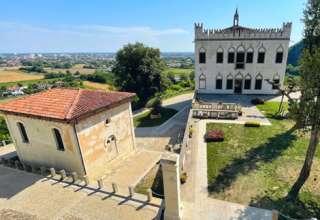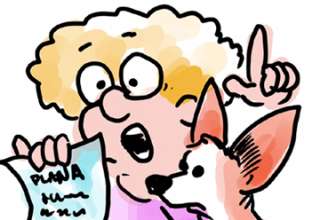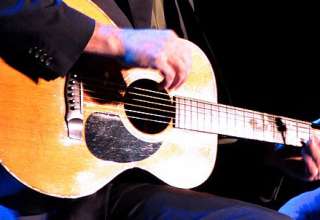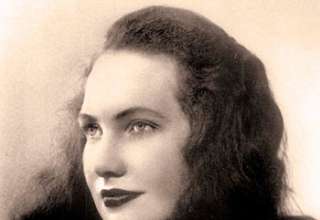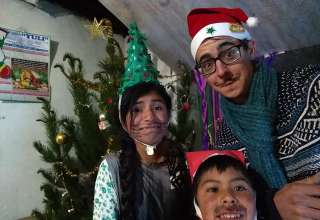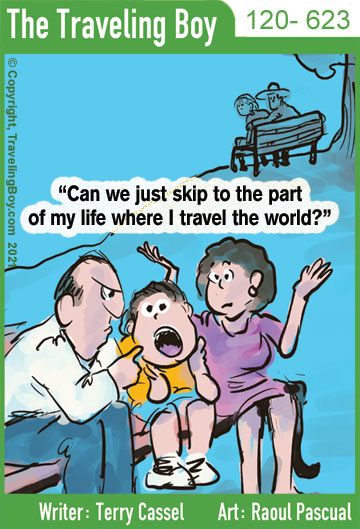Irish Send Money to Navajo Nation Hit By COVID-19, Returning Historic Favor
Courtesy Mélissa Godin
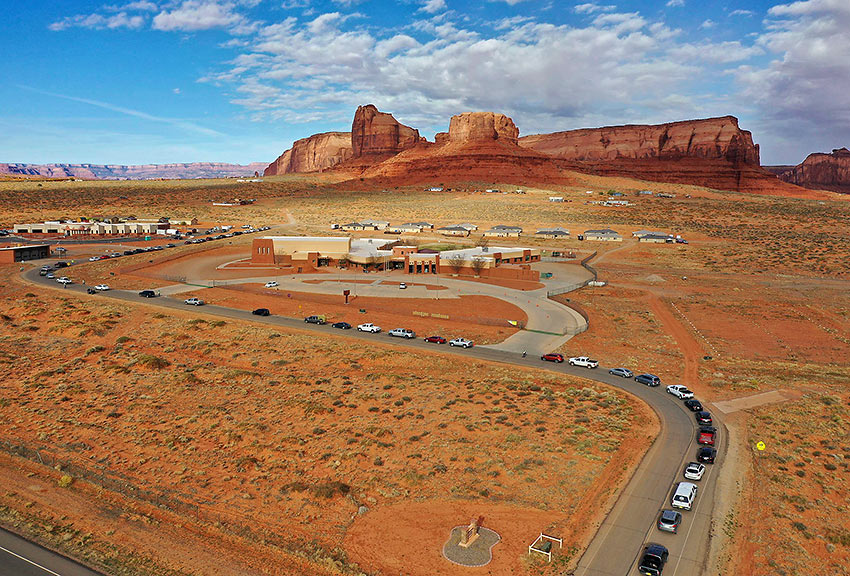
A Native American community severely impacted by the COVID-19 outbreak has received an outpour of donations from Irish people, who are returning a historic favor from 173 years ago.
In 1847, the Native American Choctaw nation sent $170 ($5,000 today) of relief aid to the Irish people impacted by the great potato famine. Now, the Irish are reciprocating the act of goodwill by donating funds to the Navajo nation, which has been severely impacted by COVID-19, with at least 2,373 cases and 73 deaths as of May 3.
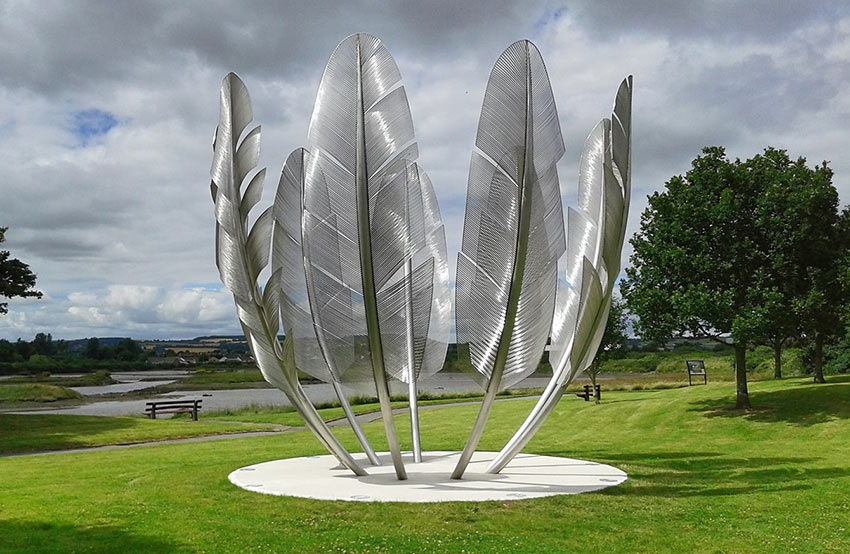
The Navajo nation has one of the highest infection rates per capita in the United States. It reported its first two cases on March 17 and the number of cases has continued to rise. Up to 40% of people living in the nation do not have access to running water in their homes and 10% do not have electricity. A GoFundMe campaign raising funds for bulk food and medical supplies has already reached $1,769,300, thanks in large part to Irish donors.
“From an Irish brother to our native American brothers,” writes donor James Fallon on the campaign page. “Karma always comes back around.”
It is said that back in 1847, the Choctaw nation heard about the famine from an Irish man overseeing the forced displacement of Native Americans. At the time, the Choctaw people were among the 60,000 Native Americans that had been recently dislocated from their ancestral homes. Despite their limited means, the Choctaw nation decided to help, and sent over funds that were used to purchase food, blanks and feed for livestock.
The Irish people never forgot this act of generosity. In 2017, a sculpture of nine eagles feathers called Kindred Spirits was unveiled in Bailick Park in Midlton, County Cork, Ireland. The following year, Irish Prime Minister Leo Varadkar announced a scholarship program for Choctaw youth, calling the relationship between the two communities “a sacred bond…which has joined our peoples together for all time.” He added, “your act of kindness has never been, and never will be, forgotten in Ireland.”
Homeless in Border Town Getting By, Livin’
By Donovan Quintero, Navajo Times

She didn’t hesitate to give what she could give. Shylah Pettigrew knows all too well what it feels like to be hungry and thirsty. Her years of living on the streets, as well as the teachings of her mother, taught her to be compassionate, she said. “You can’t pass somebody by without offering,” she said. The Lupton, Arizona, native saw her cousin and several other people sitting outside where she was attending a birthday party. The people, whom the city of Gallup categorizes as transients, or homeless, sat on the concrete bench enjoying the warm Saturday afternoon sunlight in downtown Gallup.
Pettigrew brought out plates of food and some water to the people she refers to as her “street family.”
Her cousin, Shawn Arthur, said he was thankful for the food.
“When you give somebody a soda or a sandwich, you can see the joy in (his or her) eyes,” Arthur said, who is also from Lupton.
Banned From Home
Arthur said his family told him he could not go home until the coronavirus pandemic was over. He thought they were joking around until he tried going home one day, he said.
“I tried going back,” he said. “They told me, ‘Nope, you stay in Gallup.’ They said, ‘You stay there until this thing is over with.
“They dropped off my clothes,” he said, “and I carry it around now.”
The street life Pettigrew’s cousin was living is a life she once lived. While the streets offered freedom, they also offer hardships.
Hunger, thirst, a place to sleep, where to use the restroom and maintaining hygiene were some of the hardships.
“Nobody’s perfect, everybody suffers from an addiction,” Pettigrew said. “Nobody’s better than one another.
The heavily tattooed Pettigrew said there was no room for self-pity on the streets.
“Don’t wait for somebody to bring it to you,” she said. “I have to get the point through because you gotta’ do it for yourself. You can’t just sit there all day and let the day pass you by without doing something for yourself.
“If you don’t have a place, build a little hut,” she said. “You can’t sit there and make people feel sorry for you. Especially when this crisis is going on.”
As a public service, the Navajo Times is making all coverage of the coronavirus pandemic fully available on its website. Please support the Times by subscribing.
See where the virus is on the Navajo Nation now.
How to protect yourself and others.
U.S. Surgeon General shows how to make your own facemask in under 2 minutes. (Video)
Resources for coronavirus assistance
Blame is Unfair
With the pandemic raging in the heart of Arthur’s and Ray-Ray’s hometown, the spotlight, they say, that’s painted them as the being the root cause of the sudden spike in the number of confirmed COVID-19 cases was unfair.
An incident at the Gallup Detox Center, where intoxicated transients unable to care for themselves are taken to, occurred in the first weekend of April.
A man, infected with the virus, was possibly exposed more than 150 other people at the detox center. Since then, the number of confirmed cases in McKinley County skyrocketed from 70 cases, on April 8, to 820 cases, according to the New Mexico Department of Health.
“If they had closed NCI down when this all happened, I don’t think this would have spread more,” Ray-Ray said. “They should have shut it down. These people, they don’t know how to think. They should have shut it down already. (Navajo Nation President) Jonathan Nez, they should have shut it down already. We wouldn’t have had more cases.”
“They think we’re infected,” Arthur said, referring to his family. “We can’t go home because they don’t want us home. They think I might expose them to it. Which might be true, but I got tested already. We’re not carrying the influenza, or whatever it’s called.”
Tests, Then Hotel Room Stays
Arthur showed a piece of paper from the Rehoboth McKinley Christian Hospital that stated he was tested for the virus, which, he said, came back negative.
“If you don’t get tested they take you to a hospital and take you a motel and stay there for three days,” he said, as another transient coughed nearby. “For what, you know?”
Since the outbreak, 130 people, according to Rehoboth McKinley Christian Hospital spokesperson Ina Burmeister, were currently being housed at one of the hotels in Gallup.
Both RMCH and Gallup Indian Medical Center were testing the homeless population and then sending them to a hotel room where they waited for test results.
“They stay there until cleared,” Burmeister said on Tuesday.
Neither hospital could force people to stay in the hotels, she added, but most of the people they tested complied and agreed to stay at the hotels and wait for their results.
Capt. Erin Toadlena-Pablo with the Gallup Police said the department’s public service officers only responded to complaints called in by the public.
“We are not looking for people to be tested,” she said on Tuesday. “Nothing has changed as far as our standard operation of procedures.”
Would Hurt Lose One
Pettigrew spoke with her cousin and the other people as they ate the food she gave them.
“I met some of these guys out here drinking,” she said. “It would hurt to see one of these guys gone.
“You’ve been around them for a couple of years,” she said. “Nobody has a place to get something to eat. There’s really nowhere to turn and it bugs me, you know? That people are quick to judge, to see somebody who’s gonna sit right here.”
“It’s self-morals, self-respect, you know? It’s just who I am. Just to see the reaction on people’s face when you offer them to get them something to eat regardless of this disease that’s going around. It’s just taking care of one another. Just to survive,” she said.
Arthur and Ray-Ray finished their sandwiches and thanked Pettigrew. It was time to head back to their camp, they said, the location of which they wouldn’t divulge.
“We need supplies out here, man,” Arthur said. “Open the public restrooms back open too.”
